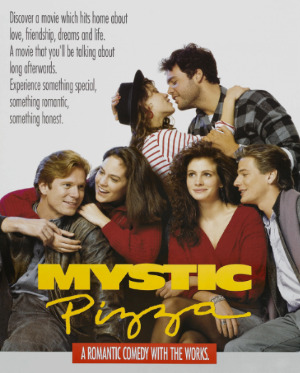PORTUGUESE PIZZA
There are two movies that take place in New England which center around Portuguese people. One is Passionada, which is set in New Bedford, Massachusetts (home to Moby Dick author Herman Melville); the other is Mystic Pizza, about the employees of a restaurant in Connecticut.
Passionada (2002), directed by Dan Ireland, is a romantic comedy that may be a bit formulaic, but I bought into the love story hook, line, and sinker (I use that reference because many Portuguese men first started arriving to the U.S. as whalers and fishers). Sofia Milos portrays Celia, a gorgeous young Portuguese widow whose husband, a fisherman, died at sea. Her naive 16-year-old daughter, played by Emmy Rossum, wants to be a professional gambler and sneaks out to a casino where she meets a down-on-his-luck British card-counter Charlie (Jason Isaac of Harry Potter and the Chamber of Secrets) who’s new in town. His luck is shaky, and he now lives in a cheap motel, having been banned from the local casinos for Portuguese players and others. but he becomes fascinated with Celia when he sees the seamstress singing fado in a restaurant.
When Charlie is rebuffed, he gets aid from his only friends, a wealthy couple, Lois (Theresa Russell) and Danny Vargas (Seymore Cassel), a former gambler, who lend him their Jaguar XKE, sailboat, and home to convince Celia that he is a successful and wealthy entrepreneur in the fishing business. The widow falls for the Brit, and the dating and revelations ensue.
You’ll love the scenic background settings of the Portuguese fishing community, mouthwatering seafood cooking, and casino gaming that flesh out the story. Deceptions backfire, but Charlie learns the hard way how to turn his life around, and Celia does what she can to move on from her grief. After all, she still has needs! It really is a sweet film, and well worth visiting.
I just watched Mystic Pizza (1988, directed by Donald Petrie) for the umpteenth time, and I love it as much now as the first time I saw it. It is, in turns, funny, dramatic and poignant, with doses of heartache and feel-good. It’s about three young women in a small fishing town, learning about life and love and their accompanying joys and disappointments. Annabeth Gish and the (then) relatively unknown Julia Roberts play Portuguese sisters from an immigrant family who work at a pizzeria with the (then) relatively unknown Lili Taylor, who is a kick as the exuberant JoJo who struggles to remain true to herself while being passionately in love with Bill played by the (then) relatively unknown Vincent D’Onofrio, who wants her to make a life commitment. A pre-Two and a Half Men Conchata Ferrell (fairly well-known by then as a character actress from Network and other films) is terrific as the middle-aged childless restaurant owner who keeps the three waitresses under her wing. (Also look for a young Matt Damon in this as well.)
As the girls’ loyalties are tested, and they go through relationship heartaches, this dramedy will no doubt call to mind your feelings and experiences at the young age of these characters. Even as the script is innocence cubed, the largely credible story and rather appealing setting — and awesome acting — make this a guilty pleasure of a date-night movie. What fascinates me now is that someone of Portuguese ancestry could be viewed as undesirable by the upper class, but that’s part of that late-80s innocence to which I refer.
It also has one of my favorite lines from a film: Kat (Annabeth Gish, who works all the time but the star that I thought she’d be) shows up late to work because of an affair with a married man, it causes her sister to be late for a party; Julia Roberts hurls the mop to the floor saying, “Wipe your conscience!”
So why the Portuguese references in these films? There’s a proud history to be had in New England, according to the New England Historical Society. In Passionada (which isn’t to my knowledge a Portuguese word), there is a pivotal scene at the Feast of the Blessed Sacrament. The 105-year-old occasion is the largest Portuguese festival in the world. It reflects both the size and the identity of the Portuguese-American population in New England. It began in 1915, when four Madeiran men organized a feast at the Church of the Immaculate Conception in New Bedford. They did it to celebrate the safe arrival of Portuguese immigrants after a stormy journey. The festival mimicked the traditional religious feast observed in their village on Madeira Island. It included a celebration of the Roman Catholic Mass, a grand procession, traditional food and folk dancing — and still does.
Portuguese immigrants, Fall River, Massachusetts. Photo by Lewis Wickes Hine, June 21, 1916. (Library of Congress)
Two great waves of Portuguese immigration gave Southeastern Massachusetts and Rhode Island the densest concentration of people with ancestry from Portugal, including the Azores and Cape Verde. Portuguese families started to come to the United States in larger numbers around 1870 just as the whaling industry began to decline. They worked in New England’s booming textile mills, in whaling and fishing. And the women worked as seamstresses in garment shops.
A series of volcanic eruptions in the Azores from 1957-58 spurred the second wave of Portuguese immigration to the U.S. The Capelinhos volcano, on the coast of the Azorean island of Faial, erupted on Sept. 27, 1957. And it didn’t stop until Oct. 24, 1958. No one was killed, but the volcanic activity covered the island with ash. It also destroyed homes and forced several thousand residents to leave. As a result, Congress in September 1958 passed the Azorean Refugee Act allowing 4,800 Azoreans to immigrate.
Though Rhode Island has the densest Portuguese population, it only has the third largest in the United States. Massachusetts has more Portuguese residents with ancestry from Portugal than any other state in the country.









